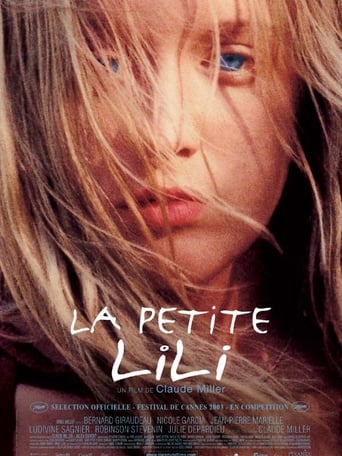wvisser-leusden
'La petite Lili' (= French for 'the small Lili') is constructed after a theater-play by the great Russian Anton Chekov. This film moves on slowly, yes, focusing much more on dialogs than on visuals. Allowing its public plenty of time to keep track.Its setting connects only to well: a film-crowd at leisure, on holidays in the French countryside. In this respect there must be praise for the visuals of a film-part that never gets any praise: the introduction, cleverly putting you in the right holiday-mood.Right thereafter comes the shock: female lead Ludivine Sagnier is shown blatantly naked. This makes a very strong visual, but not one that fits well in this film's overall setting. However, as 'La petite Lili' has just started, maybe its viewers are not yet aware of its overall setting. Whatever director Claude Miller had in mind, in hindsight one must conclude that his naked Ludivine is too much.Having survived this out-of-tune whirlwind-start, you can sit down to watch comfortably. 'La petite Lili' provides a well-balanced story, acted out by some very good actors. Just enjoy.
moimoichan6
The most annoying thing about french movies about cinema is certainly their need for self-criticism. By doing so, they think they can hide themselves from any other criticism. It's exactly like when someone tells you - with an ironic intonation - all his major flaws, only in order to be contradict. But showing your flaws is not suppressing them.And so it goes with Claude Miller's "La Petite Lili". This movie is a naturalist drama, where you can only watch "actors playing their parts", and who speak by "mots d'auteurs", trying to reach by them a certain "psychological truth". Furthermore, there're indeed an impression of constant semi-failure in all the scene of the movie, even in the one where a character says so. And, once again, it is not because all this is underlines by the movie itself that it's not true.But the movie seems better than that and manage to get over all the clichés of a certain french "cinema d'auteur" -with the DV in bonus. Maybe because Proust's shadow, more than Tcheckov, seems to be everywhere in the movie. The writer is directly quote twice in the movie. The firth evocation - more of an invocation by the way - is made by Brice, the conventional director, who, in order to seduce the "jeune fille en fleur" Lili, quotes "Les plaisirs et les jours", where he found "something beautiful about the desire's angst". This sentence, of course, perfectly fits with the preoccupation of Lili, tortured double of Anne Baxter in Mankiewiictz's "All about Eve". Later on, Simon - the great Jean-Pierre Marielle - looking for something to argue with his doctor he can't stand, says to him that his illness comes from intelligence, and therefore, he needs an intelligent doctor to cure him. This sentence is a reminiscence of what's Marcel told to the Doctor Cottar in "In search of lost time". Of course, for it's hard to establish one and only direction for the movie, you can reproach to Miller to use as many cultural references as possible - Tchekhov, Proust, Mankiewicz - in order to satisfied his intellectual spectators. However, the Proust's way goes beyond Lili's "Desire's angst", and of all the characters, and gives birth to strange scenes in the second part of the movie, where the events of the first one, like in Proust's, are lived a second time by memory and artistic creation. It even reminds me of Eustache and the shooting of "La Maman et la putain".Everyone tries to transcend his own flaws, his pitiful routine, his ridiculous past and present to transform them in artistic energy - and especially Lili. Meanwhile, Simon meets Michel Piccoli, his fictional double - another proustian theme - and strangely walks in a foreign and familiarly stage, the artistic copy of his holiday's house. You can then interprets the movie as an old man's dream, the search of lost time of a man who never lives anything, but who sees himself as an artist through his son. Because it's also in their memories that the characters walks in this second part. They live their life once again, but changed by art, which makes them unrecognizable, and certainly more true than the little family drama they lived four years ago. The movie becomes really good in this repetition, which almost belong to the fantastic, because, as in Proust's, art gives birth to a memory which is more real than art, and life becomes then its own ghost.
winter-49
The film starts off a little awkwardly. I wasn't quite sure where it was going or if I wanted to go with it, but like all great films it slowly got under my skin. By the second half I was totally engaged and rate it right up there with my favourites. Like Antonioni's, The Dreamers, this film captures the awkwardness and passion of being young but also offers a reflection on growing older. This film is not for people looking for typical Hollywood fare. It a classic European film that draws you slowly into these characters lives. The film takes it's time to get where it's going, but when you get there you're glad you went along for the ride.
jbels
This adaptation of Chekhov's The Seagull starts out promising enough with a good ensemble cast, great art direction and interesting relationships between all the characters, but then it just peters out, especially the final film-production sequence which has absolutely nothing to say. A fair film.


